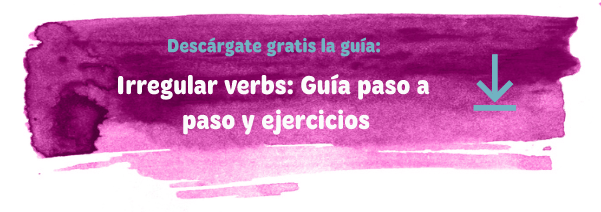What's Up! blog
el mejor contenido del mejor curso de inglés
Bring verbo irregular: significado, conjugación y ejemplos
El verbo bring es uno de los verbos irregulares que primero vas a aprender en inglés. Significa “traer” o “llevar”, así que imagina en cuántas situaciones te va a hacer falta para expresarte. Te presentamos todo lo que tienes que saber para empezar a utilizar este verbo sin equivocarte.
Bring verbo irregular significado
El verbo bring en inglés significa “traer” o “llevar”. Con algunos ejemplos lo verás más claro:
- Can you bring me my sunglasses please? They are in the room – ¿Puedes traerme las gafas de sol por favor? Están en la habitación.
- You can bring anything you want to eat like to the party: healthy snacks, fruit, sándwiches… – Puedes llevar a la fiesta lo que quieras comer, como: tentempiés saludables, fruta, bocadillos…
Fíjate que puedes usar este verbo con objetos físicos o también con conceptos figurados, sentimientos o sensaciones subjetivas:
- The beginning of September brings me lots of joy. – El inicio de septiembre me trae mucha felicidad.
- Spring brings warmer temperatures. – La primavera trae temperaturas más cálidas.
¿Cuáles son las formas del verbo to bring?
Con el verbo irregular bring, las formas de pasado y de participio coinciden, lo que no deja de ser una ventaja para aprenderlo.
Infinitivo: to bring
Pasado: brought
Participio: brought
Gerundio: bringing
Las formas de pasado, participio y gerundio se usan para formar diferentes tiempos verbales.
Formas de bring verbo irregular
Present continuous
Se forma con el verbo to be y bring verbo irregular en gerundio.
I am bringing (estoy trayendo)
You are bringing (estás trayendo)
He is bringing (está trayendo)
We are bringing (estamos trayendo)
You are bringing (estáis trayendo)
They are bringing (están trayendo)
Present perfect
Esta forma verbal se forma con el auxiliar to have y el participio de pasado del verbo bring.
I have brought (he traído)
you have brought (has traído)
he has brought (ha traído)
we have brought (hemos traído)
you have brought (habéis traído)
they have brought (han traído)
Past simple
La manera de formar este tiempo verbal es muy sencilla, con la forma de pasado del verbo bring.
I brought ( traje)
you brought ( trajiste)
he brought ( trajo)
we brought ( trajimos)
you brought ( trajisteis)
they brought ( trajeron)
Past perfect
I had brought (había traído)
you had brought (habías traído)
he had brought (había traído)
we had brought (habíamos traído)
you had brought (habíais traído)
they had brought (habían traído)
Ejemplo de frases con bring verbo irregular
Algunos ejemplos de bring verbo irregular en frases.
- I had brought my skateboard because Mary wanted to try it! – Había traído mi monopatín porque Mary quería probar.
- Bring me some apples from the shop. – Tráeme algunas manzanas de la tienda.
- They have brought a homemade cake. – Han traído un pastel casero.
- Who is bringing their swimsuit to the pool? – Quién está trayendo / quién va a traer su bañador a al piscina.
Bring es un verbo irregular que conviene aprender y que nos va a ayudar en multitud de situaciones comunicativas. ¡Practica sus formas verbales!
Posts relacionados:


